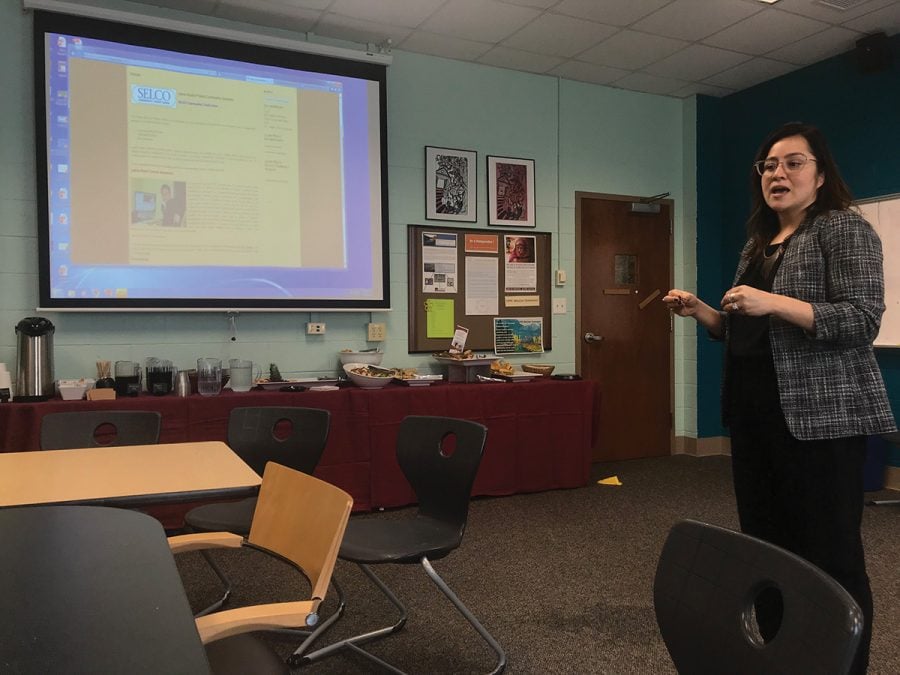Dr. Sonia De La Cruz inspires through filmmaking
Dr. Sonia De La Cruz visited Guilford College on Monday, Jan. 28, to share some of her work as a documentary filmmaker and open a discussion about how media can be a catalyst for social change. As an Assistant Professor of Communication in Media Activism at the University of Washington, Tacoma, De La Cruz teaches students how to plan, write, film and edit their own documentaries covering local issues and stories in the community.
Focusing primarily on the difficulties Latinx communities and indigenous peoples in the Americas face, De La Cruz creates digital film projects for nonprofit organizations in the U.S. as well as international non-governmental organizations (NGOs).
“One of the things that really impresses me about Sonia is that all of her documentary filmmaking is focused on looking at communities that historically have not had much of a voice in the mainstream,” said Engage Teaching Specialist and Program Coordinator Sonalini Sapra. “When I was thinking about speakers to invite, Sonia naturally came to mind since her approach to social change is something that I don’t see a lot of at Guilford.”
De La Cruz’s visit began with a community breakfast in King Hall at 8:30 a.m., where attendees were able to learn about Sonia’s work on a more personal level. Those in attendance also had the opportunity to share their thoughts on the role of media in the modern world.
“I was born in California but most of my family lived in Mexico and my parents wanted me and my brother to grow up in Mexico to get that perspective,” De La Cruz said. “I remember most of my childhood always being across borders, and so a lot of my work and the way I see the world is shaped by my bicultural upbringing.”
Following a lunch with students, Sonia gave a presentation at 2:00 p.m. on her Latino Roots Project, which aims to uncover the often overlooked history of the Latinx community in Oregon. Students in the project have the opportunity to hold their own panels and create their own documentaries for educational institutions throughout the state.
“The state of Oregon historically has had its identity centered on the legacy of the white pioneer,” De La Cruz said. “But Latinos have been in Oregon for a very long time. So the organizers said ‘Let’s create a project that highlights these stories to support the Latino community at the University (of Oregon) and shift the lens of how Latinos have been perceived not just in Oregon, but in the country.’”
In the future, De La Cruz hopes to expand the Latino Roots Project across the West Coast and beyond to continue to discover more about marginalized communities. This type of project has relevance at Guilford as well.
“The Center for Principle Problem Solving really wants to have faculty incorporate a more place-based curriculum into their classrooms,” Sapra said. “When Sonia described the Latino Roots Project, I thought that could be a really interesting contribution to some of the work our faculty are doing.”
For a final community discussion, Sonia invited Guilford students, staff and faculty members to a screening of her and her friend Lynn Stephen’s documentary, “Sad Happiness: Cinthya’s Transborder Journey,” at 7:00 p.m. The story explored the differences between the rights of U.S. citizen children and their undocumented parents by following 11-year-old Cinthya on her trip to visit her extended Zapotec family in Oaxaca, Mexico.
“I really like that ‘Sad Happiness’ was from a child’s perspective,” said sophomore Khaira Bolden. “I think it’s great how at the end Sonia was talking about how the goal of this was to humanize this experience because in the media it’s so dehumanized.”
Bolden expanded on the power of documentaries.
“It depends on who you are,” Bolden said. “If you are more open-minded and compassionate, documentaries can really affect you and the way you deal with people on a daily basis.
“Also if you are someone that’s really driven, it’s something that could make you want to help make a change because you are seeing the issues and struggles portrayed right in front of you.”
As De La Cruz’s visit drew to a close, Sapra expressed her hopes for what students will take away from watching “Sad Happiness” and learning more about the power of documentaries.
“I want students to have a better sense of the role that media can play in creating change,” Sapra said. “Sometimes we use media in our everyday lives in a not so thoughtful way when it’s a perfect vehicle for making an impact.”
If you wish to learn more about Sonia De La Cruz’s work, you can watch her documentaries by visiting https://vimeo.com/sdelacruz.









